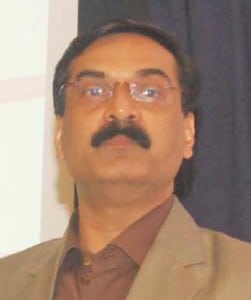
Dr Abhay Wagh, Deputy Secretary, Department of Higher and Technical Education, Government of Maharashtra, shares his views on how technology is becoming the vital component of the state’s educational roadmap
 What initiatives have been taken by your department to make optimal usage of technology?
What initiatives have been taken by your department to make optimal usage of technology?
We recognise the fact that technology is an important tool for achieving good governance and improving the quality of services. In the department, there are numerous outstanding examples of e-Governance solutions running successfully. We have online admission system for technical education, through which the admission process has become fully automated. Last year, about 4 lakh students and their parents could sit at home and fill the admissionform instead of waiting in long queues. It not only saved their ravel ost and time, it also reduced errors associated with manual processing. Then there is the e – Library:, through which selected institutes have invested in and developed of e-learning resources, e-books, online journals and other e-content from national / international sources. These facilities are provided online and can be availed by students and faculty anytime.
Other technological solutions that we use include – Online Feedback & Students Grievance Redressal system , Online approval for educational institutions, Video conferencing systems for greater participation in administration, Online Management Information system for Technical Institutes in Maharashtra.
Are any step being taken for connecting higher education institutes to enable knowledge sharing?
Great progress has been made for connecting Institutes of Higher Learning for developing a knowledge network to share, disseminate, collaborate and generate information. High Capacity Internet Bandwidth is being provided at subsidised rates to universities and Institutes of Higher Learning and about 1400 Institutes (including Universities) of Higher Learning in Maharashtra have availed such connections under National Mission on Education through Information and communication Technology (NMEICT) till date. Further, National Programme on Technology Enhanced Learning (NPTEL) has been launched to provide e-learning through online web and video courses in engineering, science and humanities. Through Technical Education Quality Improvement Programme (TEQIP), selected institutes have been provided funds for Campus Wide Networking, Networking between institutions for enhancing access to and sharing of Learning Resources available in a cluster and of course provision of Internet. Further, Information Exchange Network has been established in Non – Agricultural Universities for Information Exchange between these Universities, Colleges and State Government.
Do you think technology can be used to enhance access in higher education?
Technology can be used to increase accessibility to higher education, especially to the vulnerable and disadvantaged sections of society who couldn’t join regular education. In Maharashtra, Yashwantrao Chavan Maharashtra Open University (YCMOU) has launched EduSat-based education, supported by the Indian Space Research Organisation (ISRO). The university has established several Virtual Learning Centres (VLCs) in the State, each having two-way audio and video communication facilities. The students registered for programmes at the VLC attend lectures there. The experts deliver their lectures from the main hub at the university headquarters or from the substudio at Pune.
What are the future plans of the department?
One of the most important initiatives being planned by the department is integration with Aadhaar project. The financial disbursements like salaries of teachers, scholarships of students. shall be linked to Aadhaar, ensuring guaranteed and targeted delivery of services to unique and genuine beneficiaries. It shall greatly help in weeding out duplicate and fake beneficiaries from the system.























